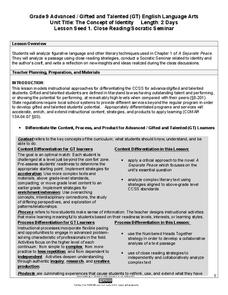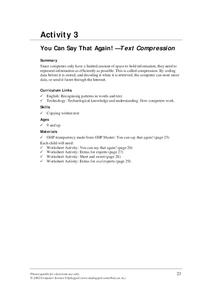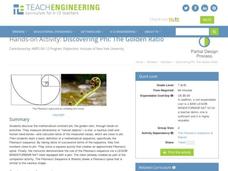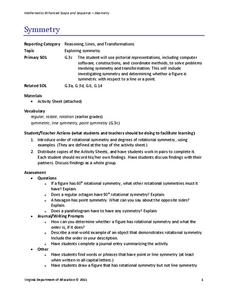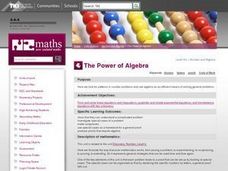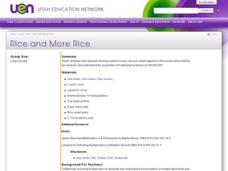Maryland Department of Education
The Concept of Identity Lesson 1: Close Reading/Socratic Seminar
John Knowles' A Separate Peace provides readers with an opportunity to develop their close reading and analytical skills as they look for what Knowles feels are the factors that shape our identity.
Maryland Department of Education
The Concept of Diversity in World Literature Lesson 1: Unit Introduction
To launch a unit study of the concept of diversity in World Literature, class members compare Chinua Achebe's essay, "An Image of Africa: Racism in Conrad's Heart of Darkness" and Richard Rodriguez's essay, "The Chinese in All of Us: A...
Charleston School District
Pythagorean Theorem and Converse
You've heard that it is true, but can you prove it? Scholars learn the Pythagorean Theorem through proof. After an overview of proofs of the theorem, learners apply it to prove triangles are right and to problem solve. This is the second...
Virginia Department of Education
Macromolecules
Finally, a chance for the class to play with their food! Allow pupils to simulate stomach acid with common foods, and introduce specific macromolecules into the mixture to explore characteristics of carbohydrates, lipids, and proteins....
Curated OER
Race and Ethnicity in the United States
Students explore race and ethnicity as it is defined by the U. S. Census Bureau. They compare data from 1900, 1950, and 2000 and identify settlement patterns and changes in population. In groups, they map these changes and discuss...
National Park Service
News Bearly Fit to Print
There are an average of three human fatalities by bears in North America every year, which is low when you compare it to the 26 killed by dogs and the 90 killed by lightning annually. The lesson encourages researching human-bear...
Curated OER
Sequencing
Learners explore the math concept of sequencing. In this math lesson plan, students examine patterns and determine the patterns needed to finish sequences.
Curated OER
Math and Music: Fibonacci Sequence
Students investigate the mathematical patterns of the Fibonacci Sequence. They determine how math is connected to music, specifically looking at music the uses the pattern sequence found in the Fibonacci Sequence.
Curated OER
First Grade Mathematics Quiz
For this math quiz activity, student complete multiple choice problems about money, shapes, patterns, and more. Students complete 15 problems total.
Curated OER
Shapes, Patterns, and Plants
Students imagine they are animals in the Palace Facade painting. In this Palace Facade lesson plan, students observe and discuss the geometric and organic shapes in the painting shown to them.
Curated OER
Converge or Diverge?
Students prepare for the calculus concepts of limits by examining sequences that converge and diverge. By using an Excel program that generates sequences, students manipulate the starting number, multiplier and add-on values, and examine...
Computer Science Unplugged
You Can Say That Again! – Text Compression
Compression, the process computers use to store information, is the focus of a resource that presents two different stories that describe the concept of compression by eliminating repeated letters and replacing them with a pointer. The...
Teach Engineering
Discovering Phi: The Golden Ratio
Fe, phi, fo, fum. This activity leads pairs to find the ratio of consecutive terms of the Fibonacci sequence. The pairs find that the Fibonacci sequence can be found in many places. A discussion with the class shows that the ratios found...
Office of Migrant Education
Poetry: Form, Syllables, Mood, and Tone
Looking for a resource to introduce homeschoolers and other out-of-class learners to the elements of poetry? Check out this packet that defines and illustrates important poetry terms.
K12 Reader
My Sled is Red
Celebrate the snow with a quick exercise featuring a short poem about a sled. Learners practice -ed words and answer three included reading comprehension questions.
Curated OER
One-Word Modifiers: Adjectives and Adverbs
Introduce your students to adjectives, adverbs, and the differences between them with this helpful grammar presentation. Though it appears long at 79 slides, note that each slide is doubled, with the first slide asking a question and the...
Curated OER
A Closer look at Oil and Energy Consumption
Upper graders analyze basic concepts about the consumption, importation and exportation of the worlds oil production. They create several graphs to organize the data and draw conclusions about the overall use of oil in the world.
EngageNY
Informational Essay Planning: Analyzing and Selecting Evidence
Class members look again at the end-of-unit essay prompt for A Mighty Long Way. After reviewing the requirements of the essay, they use their Gathering Evidence note-catchers and color-code the evidence that matches the two questions in...
02 x 02 Worksheets
Symmetry
Get learners' minds rotating and reflecting while looking for symmetry. Pupils investigate figures to determine the number of lines of symmetry and if the figure has rotational symmetry. Classmates work together in groups to find out the...
Curated OER
The Function Box
Students look around classroom and identify any patterns they see, describe patterns and explain why they are patterns, use pencil to demonstrate arithmetic patterns by tapping, practice predicting patterns by using Function Box, and...
Curated OER
The Power of Algebra
First graders explore patterns. They look for patterns in number problems and use algebra as a means of solving general problems. Students devise a strategy to solve the number problem.
Curated OER
Terrific Tessellations
Students create, transform, and critique their own piece of artwork. In doing this lesson, students get more experience working with angles, lines, and measurement. They gain experience seeing, and creating their own patterns and shapes.
Curated OER
Dinosaur Math
Young scholars participate in an activity to discover patterns. They make cutouts of bones and decorate them in patterns. They work together in pairs and removes the number of bones they roll on the die. They also practice writing their...
Curated OER
Rice and More Rice
Fifth graders explore problem solving strategies for mathematical estimation. In this math problem solving lesson, 5th graders predict how many grains of rice are in a jar, practice establishing and looking for patterns in...


